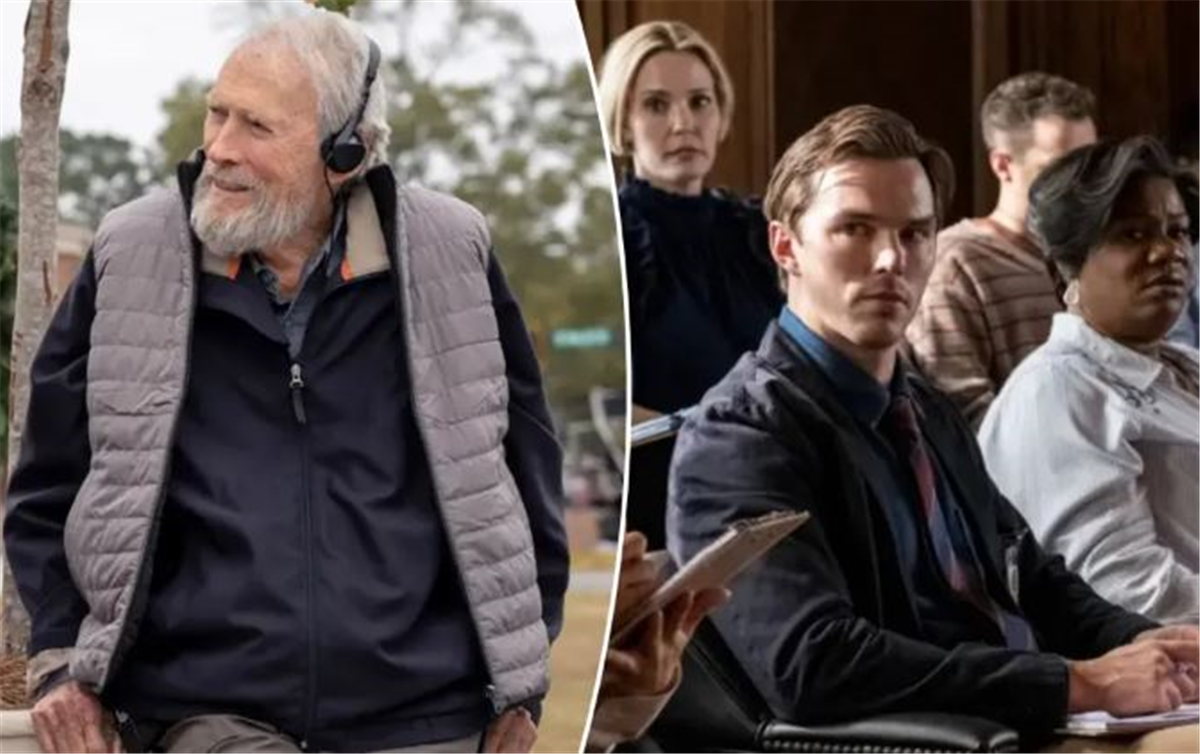I love morally ambiguous movies. They offer a lot to think about regarding what we’d do if we were in the main character’s situation, and open the door for debates on the issues they present. That’s essentially Juror #2. It’s Clint Eastwood’s modern-day 12 Angry Men, though it offers a plot twist that complicates the central case beyond arguing a man’s guilt. The film, which may or may not be Eastwood’s last, makes jurors out of us as we begin to question the information we’re given and who’s giving it. It’s an imperfect film that is intriguing until the end.
Nicholas Hoult’s Justin Kemp is seemingly a good guy. He’s there for his wife, Allison (Zoey Deutch), who’s in the last trimester of a high-risk pregnancy, and he’s been sober for several years. When he gets called to jury duty, Justin quickly realizes — following prosecutor Faith Killebrew’s (Toni Collette) opening statements — that he was at the same bar the night James Sythe (Gabriel Basso) allegedly killed his girlfriend Kendall (Francesca Eastwood). Justin thought he’d hit a deer that night but he starts to question it. Justin has to decide: does he protect himself or clear a potentially innocent man’s name?
Juror #2 Toys With Our Minds
The Moral Ambiguity Works Well
Eastwood’s film is good at messing with our minds. Jonathan Abrams’ script makes sure to leave gaps in the events of the night Kendall died. There are enough of them to cast reasonable doubt about exactly who killed her. The moral arguments are less about her death and the moments leading up to it and more about what Justin — knowing what he knows about that night — will do about it. Hoult plays his character with enough nuance that I was never fully on his side, though it’s understandable where he’s coming from.
Justin struggles with what to do, but as the case gets more complex and involved, his initial attempts to help James begin to fall by the wayside. Hoult plays with that nuance incredibly well, making Justin a bit hard to read but also just as unlikeable as he is likable. That’s difficult to pull off, but he does so with ease. Juror #2 puts our minds to work and I found myself torn on the case and unable to make a firm decision just as often as some jury members.

The moral arguments are less about her death and the moments leading up to it and more about what Justin — knowing what he knows about that night — will do about it.
The case seems cut and dry at first, but it’s far more vague than we might expect. Often, the drama shifts between putting James on trial and making a case for Justin as a suspect. The film ultimately asks if we would be willing to stand up for someone else — regardless of whether we’re unsure — if it means risking our life and comfort to do the right thing. Justin’s journey isn’t so much about proving James’ innocence so much as it’s about what he would be willing to give up considering how set he is on a decision initially.
I also appreciated the film calling into question the imperfections of the justice system, and the biases the characters — the jury and the lawyers — bring with them into the courtroom. You may find yourself still on the fence about the whole issue by the end of Juror #2 and that’s the mark of a good film. As the film nears its conclusion, the relationship between Justin and Collette’s Faith, who is hoping to become Georgia’s District Attorney, is juicy and ripe with tension, making for a thoroughly enjoyable watch.
Juror #2 Has Plenty Of Great Characters But Underutilizes Them
The Film Is Also Negatively Affected By A Nonexistent Score
Juror #2 has a star-studded cast, though some of them barely get anything to do and, when they finally do, they’re written out. One of the more interesting aspects of the film comes when Harold (J.K. Simmons) admits he’s a retired detective during jury deliberations. Like Justin, he’s not convinced that James is guilty and suspects something’s not right. When he decides to do some investigation of his own, the consequences of that pull him out of the film entirely and we never see Simmons again. It’s a shame considering what a foil he would have made for Justin.
Other actors, like Leslie Bibb, who plays the jury forewoman, get a few lines here and there but otherwise don’t have any major impact on the story or the main characters. What stood out to me the most, however, was the overall lack of a good score. Juror #2 is a perfect film for a composer to play around with. There are plenty of intense moments, close calls, and tension, but Mark Mancina’s score is practically nonexistent. When it does play, it doesn’t add anything meaningful to the scenes. Sometimes, the quiet is effective but here it’s just awkwardly noticeable.
Juror #2’s issues aren’t enough to put a major dent in its strengths. The film is never dull and the script manages to swerve in different directions as soon as things start to become too obvious. While the drama is not trying to subvert our expectations considering it’s still a straightforward watch, it isn’t willing to be too basic with its story either. The film’s fairly simple premise is nicely complicated by ethical arguments, human emotions, and actions that make it worthwhile to parse through even after it ends.
Juror #2 is now playing in theaters. The film is 113 minutes long and rated PG-13 for some violent images and strong language.
